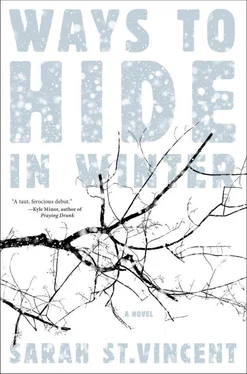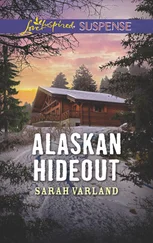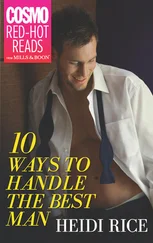I had never seen a gun that large in my life.
The big man seemed to be appraising the stranger from under his cap.
“You’re here early,” I forced myself to say in what I hoped was a light tone.
“Yeah.” Jerry cleared his throat and flicked his eyes at the stranger again.
I looked at him, too. “Would you excuse us?” I asked.
“Of course,” he murmured, and left, brushing by the hunter with his gaze fixed on the floor.
I almost expected Jerry to say something about it, but he didn’t. Instead, he simply followed the stranger with his eyes before turning back to me.
“Hot chocolate,” he muttered, easing his weight from one foot to the other. The gun barrel dangled from his arm, pointing toward the floor.
“Sure,” I replied as evenly as I could, ripping open the powdered mix and pouring it into a cup.
I could feel him watching me, taking in my movements. A few moments later, he took the steaming drink from my hand, and I began digging for my wallet.
“Hey, listen, Kathleen,” he said.
My head jerked up.
He paused. “I’m gonna have to raise the price. It’ll be three instead of two.”
I stopped with the wallet in my hand, staring at him.
“Prescription got more expensive,” he said.
“Oh.” I stood still, looking from his face to the gun. It was still pointed at the floor.
“Yeah.”
A deep apprehension seized me.
Say no, I told myself. But what would that mean? What was this?
“If we make it three,” I said, as if to myself, drawing out the words, “that would be…”
“Sixty. For twenty of them. Yeah.”
I stayed there, my hands resting on the counter. I couldn’t afford sixty. I could barely afford twenty.
But there was something I didn’t like about the way he’d looked at the stranger. Something that made my skin prickle, like an electric current.
On the other hand, refusing would mean either going without the medicine or getting it somewhere else. And getting it somewhere else would mean I wasn’t just someone whose friend’s uncle did her an occasional favor, one she didn’t really need. It would mean I was someone else, someone I knew I wasn’t.
I began pulling fives and tens out of my wallet, stalling for time as I counted. When I looked at him again, the money in my hand, I realized I was holding my breath.
I had enough. Barely, but I did.
When I held out the bills, our eyes met.
He placed the paper bag on the counter, resting his hand on it for a moment. His hat was pulled low, casting a shadow over his face.
“You take care, Kathleen,” he said finally, shuffling toward the door, the gun still dangling from his arm.
When the latch clicked behind him, the air left me. I leaned forward over the counter, my legs feeling loose and unsteady, gripping my fingers together.
I waited, staring at the clock, until ten minutes had passed. Then I swept the chess pieces into the box and went out into the cold.
When I slipped through the hostel door, Martin was nowhere to be seen. I climbed the stairs to the second floor and wandered down the hall, trying to figure out which room was the stranger’s. They were all dark.
Taking a guess, I knocked.
“Hey,” I called.
I started tapping on doors as I passed them, touching them lightly with my knuckle. “Come on,” I said. “It’s me.”
Finally a door to my right opened, and the stranger and I stood facing one another. As soon as I saw his expression, my heart sank. There was a sheen on his face, and his teeth were strangely gritted, as if he were suffocating as he tried to smile.
“Hey,” I said, trying to convince myself at the same time that I tried to convince him, “Listen, that was—it was just Jerry. Someone I know. I’m sorry he surprised you, but…it’s fine. I know him. It’s fine.” I took a deep breath. “It’s got nothing to do with you.”
“Yes,” he said, his voice too thin and bright, like an echo of a sound someone else had made.
“Really. Please don’t worry about it.”
“Yes,” the stranger said again.
I remembered that I was carrying the board game and held it out. He took it from me, and I could see how shallow his breathing was.
“I’m sorry,” I said. “I should have kept an eye on the time. I didn’t realize—”
“It’s not your fault,” he replied, giving a strange, jerking bow and turning away, closing the door.
—
The inside of the library was distinctly bluish, as always. My boots left tracks on the fading blue carpet as I wove between the stacks of black- and blue-bound books, past the librarians with their long blue skirts and pinched, blue-looking faces. The computers with their plain blue screens were in a corner, under a window. I scraped a folding chair toward one of them, ignoring the librarians’ glances, and opened the browser. Outside, it was snowing again. Sometimes it seemed as if it would snow forever.
As I watched the flakes fall, I thought of Jerry with his gun, imagining him standing before me, his eyes following the stranger with that unreadable look. But I pushed the image out of my mind. My interaction with Jerry had had nothing to do with the stranger. It couldn’t have, and I would simply be paranoid to think otherwise.
I pulled myself closer to the monitor but didn’t know how to ask what I wanted to ask. Uzbekistan, I typed, but that didn’t give me what I wanted—just statistics and weather and some pictures of buildings. I sat back and bit a hangnail. What I wanted to know, I thought, was something that almost couldn’t be put into words: why the stranger seemed at once so worldly and so vulnerable, what was behind the look in his eyes when Jerry came in. I didn’t really know him at all, I realized; or rather, what I knew was impossible to express. The way he spoke and gestured, the hesitation in his movements, his face as he looked out over the mountains on those mornings when we sat together on the porch. His patient resignation as he’d waited for the bus that would never come. His crossed arms as he’d sat behind the chessboard, talking about the place he thought of as home.
The cursor blinked.
Why people leave Uzbekistan, I tried.
That was somewhat better, although still unsatisfying. There were articles about a dictator, more or less what I would have expected for a place so far away with such an obscure-sounding name. Some of them talked about shuttered newspapers, tapped phones, children and elderly people bused out of the cities and forced to pick cotton. A few years earlier, it seemed, soldiers had opened fire on people in the eastern part of the country and killed a number that would never be known. Reporters talked to women who stood outside a hospital with pictures of their sons and husbands, waiting for news, their faces stoic but heavy with grief. There was an American military base that had been closed in the wake of the killings, I read, sitting forward as I did so and wondering if my brother had ever passed through there. But the thought was so unexpected, so incongruous, that I dismissed it quickly.
Then there were articles about the dictator himself, and even more about his glamorous family, especially the daughters. My hand on the mouse, I looked at them, the two women. They belonged to a world I could only imagine, and not only because they lived so far away. The oldest daughter, especially, seemed to skip across the globe, dressing in furs and dancing until dawn in places like Moscow and New York and London, shooting movies and singing in music videos, donning suits to speak at the UN.
I shook my head. Life was the same everywhere, I thought. Some people were born into a different universe from the rest of us, and they stayed there, floating around like angels in the heavens, their feet barely scraping the earth on which the rest of us walked. We could look up at them, but we could never touch them.
Читать дальше












